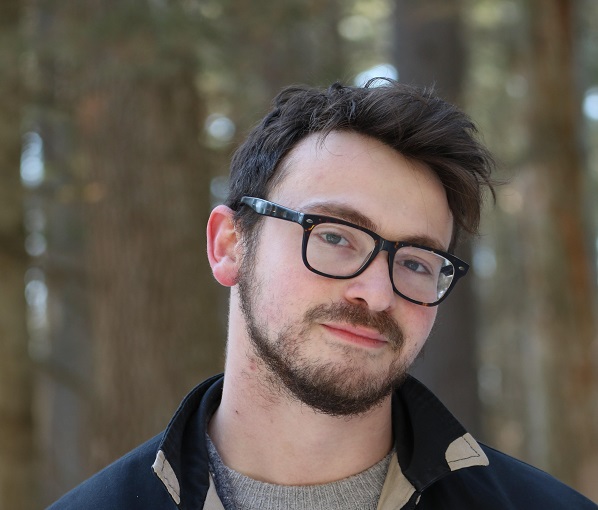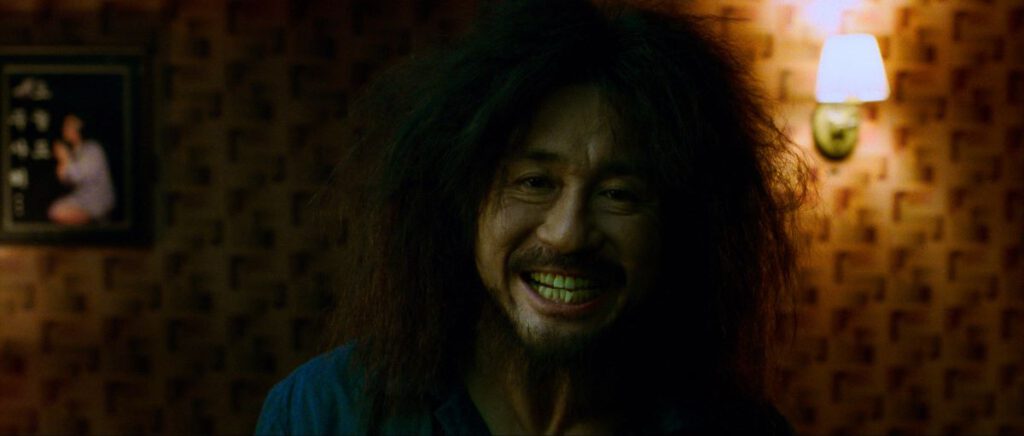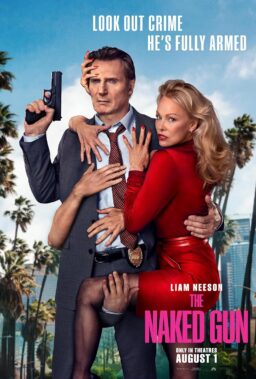In the 20 years since it was first released, Park Chan-wook’s “Oldboy” has lost none of its ability to provoke and enthrall, none of its potency as a work of art that deploys graphic violence and equally visceral style to probe the depths of human nature.
The masterpiece that propelled South Korean cinema onto a world stage and solidified Park’s status as one of its most ferociously original auteurs, “Oldboy” won the Grand Prix at the 2004 Cannes Film Festival, with jury president Quentin Tarantino personally advocating on the film’s behalf. A critical and commercial success, the film shocked stateside audiences with its savage beauty and delirious, psychological dimension; in his four-star review, Roger Ebert called “Oldboy” a “powerful film not because of what it depicts, but because of the depths of the human heart which it strips bare.”
Adapted from Garon Tsuchiya and Nobuaki Minegishi’s manga, Park’s neo-noir saga centers on Oh Dae-su (Choi Min-sik), a man kidnapped and imprisoned for 15 years by a mysterious tormentor, only to be released one day without explanation. Desperate to discover the identity and motivation of the man who stole his life, Dae-su embarks on a path of revenge that leads him into a strange and terrible maze of conspiracy.
Tumbling out of a red suitcase onto a rooftop garden, devouring a live octopus at a sushi bar, and facing down a hallway of thugs with the help of a claw-tooth hammer in one legendary sequence after another, Dae-su’s odyssey plunges him through Seoul’s seedy underworld and eventually nears a revelatory, annihilative confrontation. As it does, Park—with his transcendent visual style and obsessive eye for detail—masterfully orchestrates the story’s twisting descent into a tragedy of mythic proportions.
In celebration of the 20th anniversary of its original South Korean release, Neon is re-releasing “Oldboy” in theaters, starting August 16; the film was originally distributed in the U.S. by Tartan Films USA. To mark the occasion, Park personally supervised a digital restoration and remastering of the film in 4K HDR.
Ahead of “Oldboy” returning to theaters, Park told RogerEbert.com about his involvement in the restoration and remastering process, how growing up in Seoul under the rule of dictator Chun Doo-hwan informed his artistic interests, and which line of dialogue he considers “the key” to unlocking the long-abiding mystery of “Oldboy.”

This interview has been edited and condensed.
In restoring and remastering “Oldboy,” which you made 20 years ago, were you trying to stay true to the film’s original intent—and to who you were when you made it—or did the film transform as you returned to it from a different perspective at this stage of your life and career?
Although 20 years may not be a very long time in the lifespan of a work of art, it can be seen as such because “Oldboy” is from an era where movies were shot and screened on film. There’s nothing that was specially added to this remastered version. All I did was strive to relive the days when movies were screened on film and try to create the most pristine version possible. We would have corrected the color digitally in the present but, back then, we developed the film using the bleach bypass method. In other words, we physically treated the film negatives. The results aren’t as vivid and crisp as movies of today because of this, despite the fact it was a remastering. It’s very grainy with high contrast and low saturation. This doesn’t align with my aesthetic sensibilities as of today. However, this is in itself a record of that particular era.

I wanted to ask about two scenes in particular: the scene where Choi Min-sik’s Oh Dae-su eats a live octopus, and the corridor fight scene in which Oh Dae-su wields a hammer against a group of attackers. What do you remember most strongly about filming both of those sequences? In revisiting “Oldboy,” has your relationship to those scenes changed at all; do you perceive them differently?
The response from international audiences that took me aback the most was regarding the live octopus scene. From the start, I had a very clear idea as to what food Dae-su, who has not had contact with any living entity for 15 years, would want to eat first. He would furiously gnaw on a wriggling mass of life and swallow it. This idea is where Dae-su’s line, “I’m going to chew it all down,” came from.
The food that applies to this concept, as a Korean, is obviously live octopus. But I hadn’t thought about how non-Korean audiences would react. It ended up being an extremely grotesque scene. There are actually many Koreans who can’t stomach live octopus. And even if you do eat it, you would never eat it whole like in the film. It is likely a very dangerous act. You can even choke to death. There was even a real murder case where someone killed their lover in this manner. I really hope there aren’t any Americans who think Koreans would just put a large, live octopus in their mouths.
What entertains me most about the hallway scene now is the bald, shirtless thug with the potbelly. That’s Mr. Heo Myeong Haeng. He might have been just one of dozens of stuntmen back then, but in the past 20 years, he has become Korea’s leading stunt coordinator and a film director in his own right with two features under his belt. He made the hallway scene in “Oldboy” twice as exciting with his unmatched performance, for which he deserves all the credit.
Choi Min-sik’s performance in “Oldboy” is more impressive to me every time I revisit the film. Can you discuss what drew you to him as an actor and any favorite memory of working with him on this film?
He was already a top-class actor in Korea before shooting “Oldboy.” He was the pillar of the industry, alongside Song Kang-ho, with whom he was always compared. If Song Kang-ho is ice and modern, Choi Min-sik is fire and classical. He is in appearance a hero but seems like a jokester at the same time. He’s not a calculating personality. He is a passionate person who will charge forward, come hell or high water, if he thinks something is right. This means he is that pure.

I wanted to ask about the colors of “Oldboy,” its sickly greens and fluorescent purples, its splashes of red. What was your approach to the color correction process for this restoration, given the film’s strong contrasts and low saturation levels?
I was unrestrained in my usage of bold colors during the shooting stage. I was able to make this decision because we had done plenty of tests using bleach bypass during pre-production. If the subject is already faint in color, then there’s the possibility it’ll appear almost monotone after bleach bypass. If you put bold primary colors through bleach bypass, you get this strange and unfamiliar tone. I tried very hard to preserve this effect while remastering the film.
While vengeance and its futility are major themes in your work, and extreme violence one way those ideas are expressed in “Oldboy,” the film also explores the possibility of catharsis and redemption. Looking back, why were these ideas important to you when you made “Oldboy”?
It’s likely because of my friends, seniors, and juniors who rose up and fought the military dictatorship while we were in college. I was weak and a coward and so couldn’t actively fight, and the brave ended up being the ones sacrificed to this intense violence. That was when I became interested in themes such as guilt, vengeance, and redemption.
“Oldboy” features many allusions to classical mythology, from the name Oh Dae-su reminding the audiences of Oedipus, to Lee Woo-jin, played by Yoo Ji-tae, assuming a Yoga pose as if he’s a religious deity. Why was this mythological quality important to the story you wanted to tell?
Revenge is a very classical and mythological story subject. So is incest.
Because I’d already dealt with the division of the Korean peninsula in “Joint Security Area (JSA)” and class conflict within South Korea in “Sympathy for Mr. Vengeance,” I didn’t want to handle yet another timely social issue in my next work. I wanted to tell a story that was more foundational, primordial, and universal. And I wanted to go romanticist, rather than realistic. I wanted to tell a story about fate.

You began collaborating with screenwriter Chung Seo-kyung after “Oldboy,” and you have continued working together for 20 years. How has it felt to revisit “Oldboy,” which was made before that collaboration, and did Chung have any effect on the restoration and remaster?
After making “JSA,” “Sympathy for Mr. Vengeance,” and “Oldboy” back-to-back, I began to repent, having only created stories that pushed women to the periphery. She was who I recruited as a result. As you are aware, the films and series I’ve made since are all centered around women. Even the works that she is not involved in. That’s how much of an influence she has had on me. However, because “Oldboy” is a pre-Chung work, she did not participate in the remastering.
One of the most enduring lines of dialogue in “Oldboy” comes from Lee Woo-jin, who says, “You can’t find the right answer if you ask the wrong questions.” This idea is important in many of your films, and so I wanted to close this interview by asking about the influence “Oldboy” has had on you as a filmmaker. How has it influenced the questions that you wish to ask through your filmmaking, or led you toward certain answers?
That’s correct — that line of dialogue is the key. If anyone were to regard “Oldboy” as holding some important place in the history of mystery stories, it’d be because of that line. This was not a mystery that could be solved by obsessing over the question, “Why was I imprisoned?” It’s only when you change the question to, “Why was I released when I could have been imprisoned for life?” that you can reach the thought, “Then, why was I released after exactly 15 years?” and, “What takes 15 years to achieve?” before ultimately coming to the conclusion that’s how long it takes for Mi-do, [played by Kang Hye-jung,] to become an adult.
Life is the same. How many enigmas stay unsolved because we are asking the wrong question? When the answer is hard to figure out, let us try changing the question and asking anew.
“Oldboy” returns to theaters in a new 4K restoration and remaster, via Neon, on August 16.












